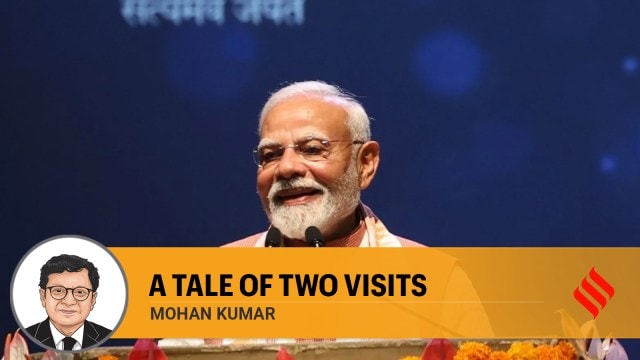Opinion PM Modi’s Sri Lanka, BIMSTEC visits highlight India’s regional commitments
BIMSTEC offers a valuable opportunity to engage in bilateral meetings on the margins of the summit. The interaction between PM Modi and the Chief Adviser of Bangladesh Muhammad Yunus, if it happens, will be watched with interest
 Prime Minister Narendra Modi. (File)
Prime Minister Narendra Modi. (File) Prime Minister Narendra Modi has two important visits this month: One to the sixth summit of the BIMSTEC (Bay of Bengal Initiative for Multi-Sectoral Technical and Economic Cooperation) forum in Bangkok on April 4, and then a visit to Sri Lanka from April 4 to 6. The visits may be seen against the backdrop of the government’s Act East, MAHASAGAR (Mutual and Holistic Advancement for Security and Growth Across Regions) and Neighbourhood First policies.
The PM, who arrived in Thailand for an official visit on April 3, held talks with Prime Minister Paetongtarn Shinawatra, with both underlining the depth of the relationship rooted in historical, cultural and religious ties, and endeavouring to bring together India’s “Act East” and Thailand’s “Look West” policies.
BIMSTEC’s original aim was to accelerate economic growth and social progress in the sub-region through joint endeavours based on equality and partnership. The inclusion of Thailand and Myanmar is of strategic importance for India, given the emphasis it places on the development of the Northeast. The summit is expected to adopt the Vision 2030 document prepared by Thailand. It is aimed at building a prosperous, resilient and open (PRO) BIMSTEC by 2030 by promoting peace, stability and economic sustainability. The summit will also adopt the report prepared by the Eminent Persons Group (EPG), which includes recommendations to reform, revitalise, and repurpose BIMSTEC. There could also be a signing ceremony related to an agreement on Maritime Transport Cooperation.
The more difficult areas of cooperation lie in taking forward the framework agreement already signed for a Free Trade Agreement (FTA). Perhaps the leaders could provide an impetus by asking the negotiators to speed up discussions. India could take the lead in this. After all, it is the largest contributor to the BIMSTEC Secretariat’s budget. India also hosts two BIMSTEC centres: One for climate in Noida and another one for energy in Bengaluru. We have offered to host three more centres, relating to agriculture, disaster management and maritime transport. The PM has been personally committed to the BIMSTEC process aimed at promoting regional cooperation.
BIMSTEC offers a valuable opportunity to engage in bilateral meetings on the margins of the summit. The sixth summit in Bangkok will be no different. The interaction between PM Modi and the chief adviser of Bangladesh, Muhammad Yunus, if it happens, will be watched with interest.
PM Modi will then proceed to Sri Lanka. This will be his first visit after President Anura Kumara Dissanayake (AKD) assumed office last year. It will also be a follow-up to AKD’s state visit to India in December last year.
Sri Lanka is the lynchpin of India’s maritime strategy on its southern flank. One of the main items on India’s agenda will be energy cooperation. PM Modi will likely attend the signing of the Sampur Solar Power Project agreement in Trincomalee. This 120-megawatt joint venture between India’s National Thermal Power Corporation and Sri Lanka’s Ceylon Electricity Board not only addresses Sri Lanka’s energy security concerns but also positions India as a preferred partner in its green transition. The eventual goal is to establish electricity grid connectivity and a multi-product petroleum pipeline to enhance trade and investment ties. PM Modi will also travel to Anuradhapura, where India is executing development projects. India will thus seek to reaffirm its role as Sri Lanka’s primary and indispensable development partner.
most read
The problem of Tamil Nadu fishermen who stray into Sri Lankan waters is a long-standing one. India will need some assurance that they will be treated humanely. A viable solution, such as deep-sea fishing as an alternative, also needs to be explored seriously. The discussions may also include the Trincomalee Oil Tank Farm. Talks have been going on to establish a joint venture to manage the tanks. The aim is to upgrade the existing facilities, refine crude oil and store it for the global market with the idea of making Sri Lanka a key player in international oil trade.
India and Sri Lanka must be fully aligned on mutual and regional security. AKD’s assurance during his visit, that Sri Lanka will not “permit its territory to be used in any manner inimical to the security of India… as well as towards regional stability”, is a solemn commitment that India welcomes and takes seriously. It will be crucial in sustaining the strategic partnership between the two neighbours.
The writer is a former Indian ambassador to France and is currently dean/professor at O P Jindal Global University. Views are personal





